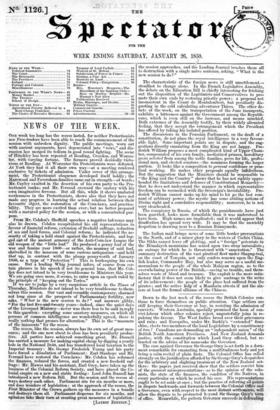NEWS OF THE WEEK.
ONE week too long has the recess lasted, for neither Protectionists nor Free-traders have been able to reach the commencement of the session with unbroken dignity. The public meetings, worn out with ancient arguments, have degenerated into rows," and dis- cussion has merged its tedium in good round fighting. The scene of Hinckley has been repeated at Reading, Croydon, and Worces- ter, with varying fortune. The farmers proved decidedly Victo- rious at Reading. At Worcester the Protectionists were defeated. At York they had it all their own way—at a meeting rendered exclusive by tickets, of admission. -Under cover of this arrange- ment, the Protectionist eloquence developed itself boldly; the Harewood and Faversham families came out in strength—of words ; Mr. Cayley exulted in the desertion of his own party to the Pro- tectionist ranks ; and Mr. Ferrand crowned the oratory with his own imaginative fervour. But all this, while it shows unabated restlessness in the Protectionists, shows also that they have not made any progress in learning the actual relation betweentheir favourite object, the restoration of the Corn-laws, and practica- bility. They are more excited than ever ; but no better prepared with a matured policy for the session, or with a concentrated pur- pose. From Mr. Cobden's Sheffield speeches a negative inference may also be drawn. Cobden recapitulated his old representations in -favour of financial reform, extension of freehold suffrage, reduction of sea and land forces, and Colonial reform; ,he indicated the ne- cessity of taking a bold stand against the Protectionists, and lug- ged out of the ancient armoury of the Anti-Corn-law League the old weapon of the "Mile loaf.' He produced a penny loaf of the war and famine year 1800—or rather, the mummy of said loaf, shrivelled in the museum of some curious antiquarian—and held that up, in contrast with the plump pennyworth of January 1850, as a type of " Protection "! This is burlesquing his own cause. But a leading Whig journal infers of course from cer- tain phrases in his speech if not its general tone, that Mr. Cob- den does not intend to be very troublesome to Ministers this year. We are going once more, it seems, to enter upon an epoch ruled by the principle of "keeping out the Tories." If we are to judge -1)y a very suspicious article in the Times of Thursday, Ministers do not intend to be very troublesome to them- selves this session. Our vast and versatile contemporary, charmed not long since at the prospects of Parliamentary fertility, now asks, "What is the new session to do ? " and answers glibly, "For the last five-and-twenty years—indeed, since the quiet days of the Liverpool Ministry—never was there less to be said in reply to this question : excepting some sanatory measures, on which all persons of common intelligence are wonderfully agreed, there is really, nothing that presses for alteration." 'This is the "massacre of the innocents" for the recess.
The recess, like the session, always has its own set of great mea- sures; and the one now about to close has been peculiarly produc- tive. All parties have achieved something great. Mr. Disraeli has carried a measure for making capital cheap by digging a yearly hole in the National Debt, and has transferred local taxation to the Imperial treasury : Mr. George Frederick Young and his party have forced a dissolution of Parliament : Earl Stanhope and Mr. Ferrand have restored the Corn-laws : Mr. Cobden has reformed the finances reduced the forces, and created a new freehold suf-
frage : Mr. finances, and his assistant, Earl Grey, have taken up the business of the Colonial Reform Society, and have placed the Co- lonial empire on a new and stable footing : Lord John Russell has introduced a new Reform Bill. But the session and the recess al- ways destroy each other. Parliament sits for six nienths or more, and does wonders of legislation : at the approach of the recess, the First Minister of the Crown gathers up the measures in a bundle and destroys them all. Parliament disperses for six months, and agitators take their turn at creating great measures of legislation :
the session approaches, and the Leading journal brushes them all to destruction with a single naïve sentence, asking, "What is the new session to do ? "


























